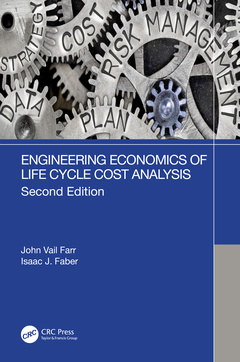Description
Engineering Economics of Life Cycle Cost Analysis (2nd Ed.)
Authors: Farr John Vail, Faber Isaac J.
Language: English
Subjects for Engineering Economics of Life Cycle Cost Analysis:
Keywords
Total Ownership Cost; Simulation Based Costing; Earned Value Analysis; Breakeven Analysis; Time Value; Multi-Objective Decisions Analysis; Isaac Faber; life cycle cost analysis; engineering economics; defensible cost analysis; accurate cost estimates; Function Point Analysis; Vice Versa; National Academy; Cycle Times; LCC Model; Cf Series; LCC; PCEs; Effective Annual Interest Rate; Discounted Payback Period; Cot Component; NPV Function; Work Breakdown Structure; Cost Driver; Cot Product; Atm System; Estimating Software Development; Parametric Cost Model; MACRS Method; Cash Flow Statements
142.05 €
In Print (Delivery period: 14 days).
Add to cart· 15.6x23.4 cm · Hardback
Description
/li>Contents
/li>Readership
/li>Biography
/li>
The rise of the information age and the digital economy has dramatically changed engineering and other technology-driven fields. With tremendous advances in computing and communication systems, major organizational upheavals, all fueled by complexity, globalization, short cycle times, and lean supply chains, the functions of engineers have significantly changed. Engineers and similar professionals must be technically savvy and have product management and costing skills all while working in a distributed and often unstable environment. This new-edition textbook is updated to cover the integration of cost, risk, value, scheduling, and informationtechnologies going beyond basic engineering economics.
Engineering Economics of Life Cycle Cost Analysis, Second Edition, offers a systems and life cycle or total ownership cost perspective. It presents advanced costing techniques such as simulation-based costing, decision and risk analysis, complex systemscosting, software, big data, and cloud computing estimation. Examples and problems demonstrating these techniques with real-world applications are also included.
All engineers and similar professionals will find this book useful, but it is mainly written for systems engineers, engineering managers, program/product managers, and industrial engineers. The text can serve as a professional reference or for use with graduate courses on advanced engineering economic analysis and cost management, and financial analysis for engineers.
1. Overview of Systems Life Cycle Costing. 2. The Science of Engineering Economics: Understanding the Time Value of Money. 3. Advanced Economic Analysis of Alternatives. 4. The Basic Theory of Interest. 5. Simulation-Based Costing. 6. Life Cycle Framework and Techniques. 7. Costing of Complex Systems. 8. Software-Intensive Systems. 9. Cost Estimating Techniques. 10. The Role of Risk, Value, and Cost in Making Decisions. 11. Costing the Cloud, Data, and Machine Learning. 12. Costing and Managing Off-the-Shelf Systems. 13. Project Management’s Role in Life Cycle Costing. 14. Use of Cost Metrics and Ratios. Appendix A. Appendix B.
Dr. John V. Farr is a Professor Emeritus of Engineering Management at the United States Military Academy at West Point and currently an adjunct faculty member at the University of Central Florida and the School of Business at Clarkson University. From 2010 until his retirement from West Point in 2017 he was a Professor and the Founding Director of the Center for Nation Reconstruction and Capacity Development. From 2007 to 2010 he was a Professor of Systems Engineering and Engineering Management and Associate Dean for Academics in the School of Systems and Enterprises at Stevens Institute of Technology. He was the Founding Director of the Department of Systems Engineering and Engineering Management at Stevens from 2000 to 2007. Before coming to Stevens in 2000, Dr. Farr was a Professor of Engineering Management at the United States Military Academy at West Point where he was the first permanent civilian professor in engineering and Director of their Engineering Management Program. Dr. Farr is a former past president and Fellow of the American Society for Engineering Management (ASEM) and a Fellow of the American Society of Civil Engineers (ASCE). He is a former editor of the Journal of Management in Engineering and the founder of the Engineering Management Practice Periodical. He has authored or edited over 200 technical publications which includes five books, seven book chapters, and over 90-refereed publications mainly on cost analysis, infrastructure, engineering education, engineering management, and systems engineering. Dr. Farr earned his undergraduate degree from Mississippi State University and Masters and PhD in Civil Engineering from Purdue and the University of Michigan, respectively. Dr. Farr is also a member of Chi Epsilon, a Founding Member of Epsilon Mu Eta, and Phi Kappa Phi honor societies. He is a member of the International Council of Systems Engineering, ASCE, and ASEM. He is also a registered civil engineer in Florida and Mississippi and a ce
These books may interest you

Life Cycle Costing for Engineers 101.34 €



